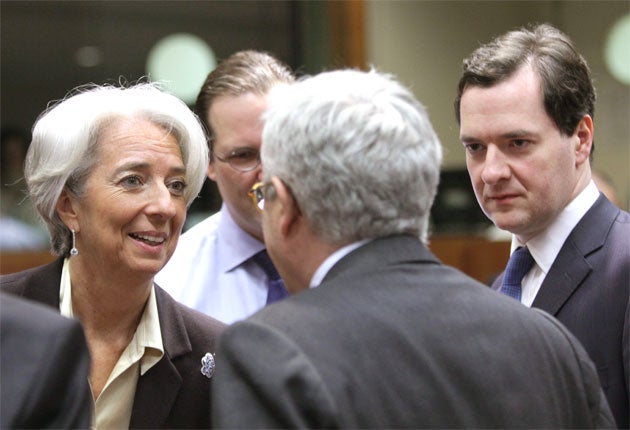Osborne fails to block European crackdown on City hedge funds

Your support helps us to tell the story
From reproductive rights to climate change to Big Tech, The Independent is on the ground when the story is developing. Whether it's investigating the financials of Elon Musk's pro-Trump PAC or producing our latest documentary, 'The A Word', which shines a light on the American women fighting for reproductive rights, we know how important it is to parse out the facts from the messaging.
At such a critical moment in US history, we need reporters on the ground. Your donation allows us to keep sending journalists to speak to both sides of the story.
The Independent is trusted by Americans across the entire political spectrum. And unlike many other quality news outlets, we choose not to lock Americans out of our reporting and analysis with paywalls. We believe quality journalism should be available to everyone, paid for by those who can afford it.
Your support makes all the difference.The Government's first foray to Brussels ended with defeat for George Osborne yesterday as European Union finance ministers backed a tough crackdown on the City. But the Chancellor won a concession after the EU agreed to consider giving London hedge fund managers greater power to operate across the EU.
In a foretaste of battles to come, Mr Osborne also called on the EU to scrap plans for "unacceptable" rises in its budget next year.
David Cameron will attempt to build fresh European alliances this week when he meets French President Nicolas Sarkozy in Paris tomorrow and German Chancellor Angela Merkel in Berlin on Friday.
Both came to Britain shortly before the general election, in visits that were widely seen as offering tacit support to Gordon Brown.
Negotiations over strict controls on hedge funds have been under way for months, with other EU nations determined to create a more stable financial system. Hedge funds have been blamed for exacerbating Europe's recent financial turmoil.
Gordon Brown managed to defer the decision – which disproportionately affects Britain because 80 per cent of European hedge funds are based in London – until after the election. Labour sources admitted yesterday that the previous government had sold its successor a "hospital pass" by persuading other EU leaders to delay the move.
Mr Osborne, who agreed he had inherited a "challenging position", accepted the inevitable as his fellow ministers supported controls on hedge funds and private equity groups, as well as requiring them to disclose detailed information to watchdogs.
Britain fears the regulations will force hedge funds to move to countries with looser scrutiny of their activities, such as the United States and Switzerland.
EU ministers also agreed to take UK concerns into account in drawing up the rules, particularly over a ban on hedge fund managers operating across borders on behalf of their offshore clients.
A spokesman for the Chancellor said: "We have reached a political agreement. It is a very good result in the circumstances, the best outcome we could have expected."
He added that the outcome "leaves the door open" to securing the concession for Britain, adding that Mr Osborne had displayed an "engaged, fully committed, fleet-footed approach to this negotiation".
Mr Osborne used the meeting to call for a freeze in the EU budget, warning that a proposed 6 per cent rise – including a 4.5 per cent rise in administrative costs – could not be justified.
He told a press conference: "I was not alone in saying that this is unacceptable. Many countries are accepting public spending restraints and for the UK, if passed, this EU budget rise would mean a £600m increase in our gross contribution to the EU and that would be unacceptable."
But he insisted he had not "banged the table" at the Brussels meeting, adding: "I tried to demonstrate the new constructive, engaged approach to discussions in the European Union. I will support British interests but I'm also interested in making sure the European economy grows and deals with some of its fiscal problems."
Mr Osborne said: "It was very important for me to show that the Conservative Government, in coalition with the Liberal Democrats, is going to be positively engaged in issues that the EU is looking at, while being very clear about British national interests."
He also put down an early marker against suggestions that national budgets could be opened to scrutiny by the EU. "Tax and spending decisions are properly issues where we are accountable to Parliament. I am happy to discuss the details [of the UK Budget] with the Commission once they have been delivered to Parliament," he said.
Under the directive endorsed in draft form yesterday, hedge funds will for the first time be put under a super-regulator from 2012. The final version will be submitted to the European Parliament in July.
The German government, in particular, had been intent on accelerating action against hedge funds. Its Finance Minister, Wolfgang Schaeuble, said: "We are determined to accelerate the pace of regulation. Up until now this was not regulated. This hole will now be closed."
The Austrian Finance Minister, Josef Proell, added: "Today, with goodwill and agreement from Britain and after a very hard struggle in recent weeks, we have succeeded... to rein in hedge funds."
Join our commenting forum
Join thought-provoking conversations, follow other Independent readers and see their replies
Comments